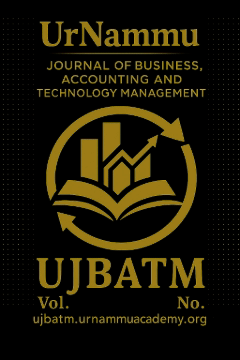Authorship Policy
The UrNammu Journal of Business, Accounting and Technology Management (UJBATM) follows internationally recognised standards for authorship to ensure transparency, accountability, and fair attribution of scholarly work. Authorship not only reflects credit for contributions but also implies responsibility for the integrity of the research and its outcomes.
Authorship Criteria
Authorship should be granted only to individuals who have made substantial intellectual contributions to the work, including, but not limited to:
• Formulating the research question or conceptual framework,
• Designing the methodology,
• Conducting data analysis and interpretation,
• Drafting or critically revising the manuscript for important intellectual content.
Mere involvement in technical tasks, data collection, translation, administrative support, or provision of funding does not qualify an individual for authorship. Such contributions may be acknowledged in an acknowledgements section but should not be listed as authors.
At least one author, typically the corresponding author, must take overall responsibility for the integrity of the entire work. All listed authors must:
• Approve the final version of the manuscript,
• Agree to be accountable for their respective contributions,
• Consent to publication.
Given the collaborative nature of modern research, it is acknowledged that not all authors may be equally familiar with every aspect of the work. However, each author should be able to identify their specific contribution and defend the integrity of that contribution.
Author Order, Number of Authors, and Dispute Resolution
The UJBATM does not impose a limit on the number of authors per manuscript. Multidisciplinary and multi-institutional authorship is encouraged, provided that each listed individual meets the authorship criteria.
• The order of authors’ names should be determined collectively by the authors based on their mutual agreement. UJBATM will not arbitrate authorship order unless disputes are formally brought to the Editor-in-Chief’s attention.
• In cases of unequal contributions, authors are required to include an "Authors’ Contributions" section to clarify individual roles and input.
• If the Editor-in-Chief suspects nepotism or unjustified authorship inclusion, they reserve the right to request a detailed breakdown of contributions. In exceptional cases, authorship may be amended in the final accepted version.
Authorship disputes should ideally be resolved at the institutional or team level before submission. If a conflict arises during the review process, the Editor-in-Chief may intervene as a neutral party to facilitate resolution. Any changes to authorship (addition, removal, or order) must be accompanied by a formal written agreement signed by all listed authors at any stage of the editorial process.
Conflict of Interest Disclosure
All authors must include a “Conflict of Interest” statement at the end of their manuscript, just before the references section. This section should clearly disclose any financial, institutional, or personal relationships that could be perceived as influencing the research, peer review, or publication process.
Examples of conflicts include, but are not limited to:
• Financial support or funding sources,
• Employment or advisory affiliations,
• Ownership of financial interests in the subject matter.
All listed authors must agree on the content of the conflict of interest statement and ensure its accuracy prior to submission.








